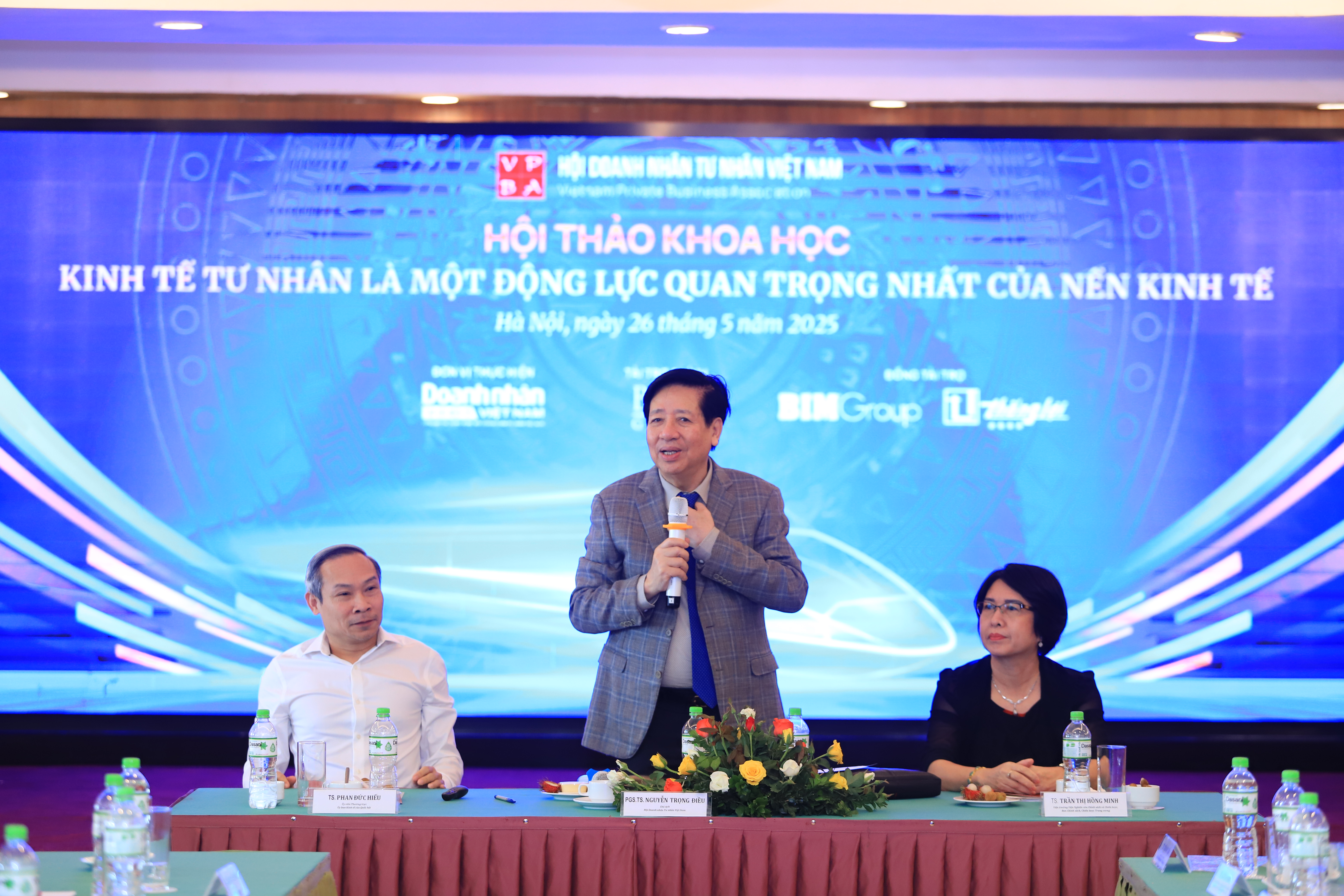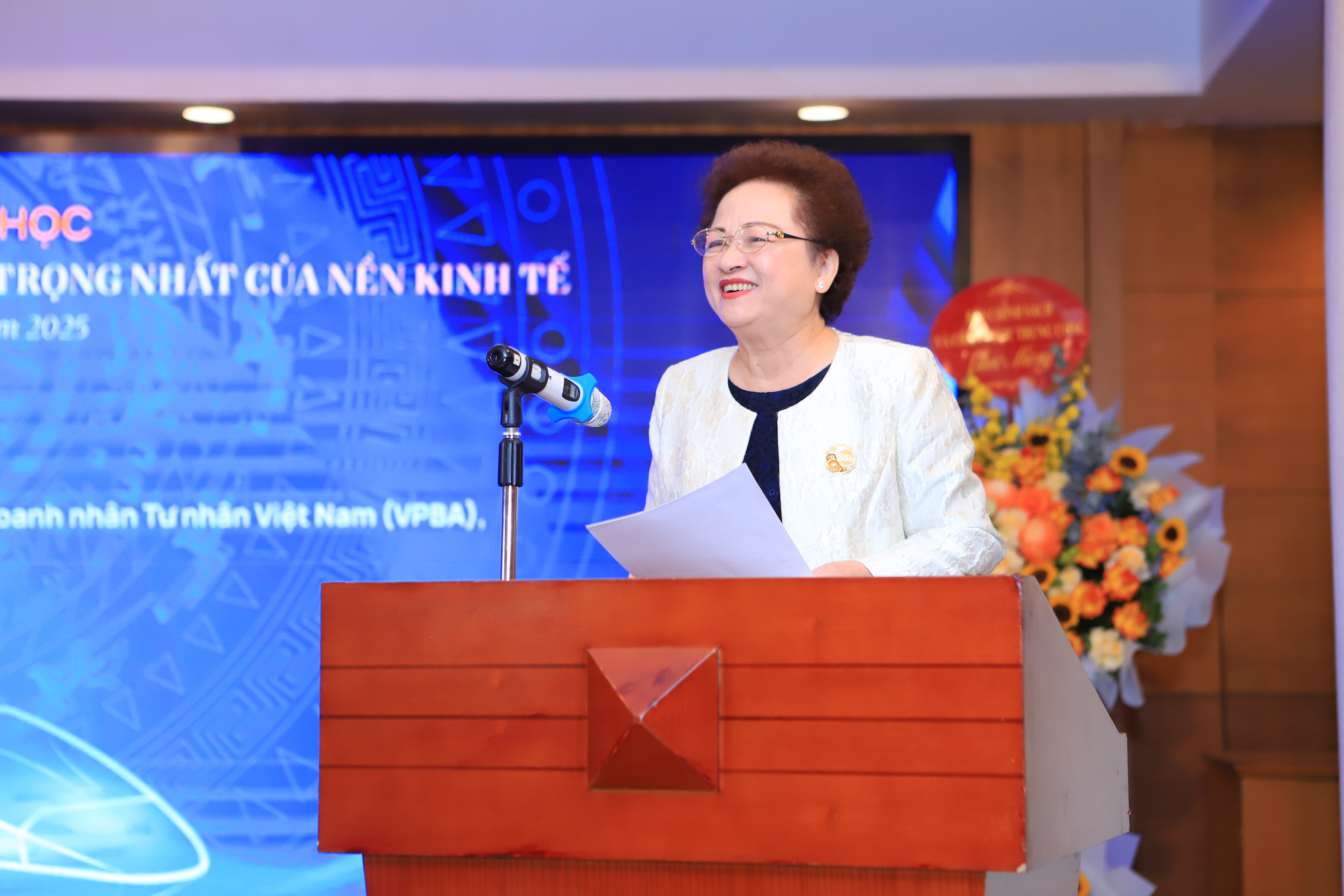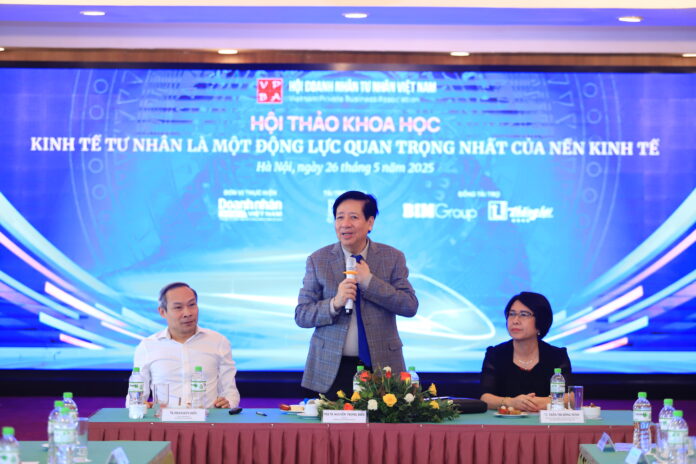On May 26, 2025, the scientific seminar “Private sector economics is the most important driving force of the economy” hosted by the Vietnamese Private Entrepreneurs Association and the Electronic Journal of Vietnamese Entrepreneurs attracted the participation of a large number of policymakers, economists, and business representatives. Here, the parties discussed current obstacles and proposed solutions to bring Resolution 68/NQ-TW into practical life.
HISTORIC TURNING POINT AND EXPECTATIONS FOR “RENEWAL PHASE 2”
In his opening speech, Prof. Dr. Nguyen Trong Dieu, Chairman of the Vietnamese Private Entrepreneurs Association, affirmed that Resolution 68 is a “historic turning point”, putting the private sector economy in the center of the service and creative system of the public service machinery.
“In order for the Resolution to be institutionalized correctly and effectively, serving the supreme goal of the country’s great development, it is necessary to join hands in researching, discussing, and unifying awareness and action,” emphasized Mr. Dieu.
With over 30 years of attachment to the national economy, Ms. Nguyen Thi Nga, Vice Chairman of the Association and Chairman of BRG Corporation, expressed her optimism about a “Renewal Phase 2” given the strong recent policies of the Party, National Assembly, and Government.
However, she also expressed her concern about the need for comprehensive, holistic, and scientific institutionalization to ensure the proper implementation of Resolution 68, helping entrepreneurs confidently invest in business development and positively contributing to the country’s overall development, worthy of their role as “the most important driving force of the economy.”
PRIORITY IS GIVEN TO REFORMING THE INSTITUTIONS AND REMOVING BARRIERS
These expectations are well-founded, as the current business environment’s inadequacies are a significant hindrance to the development of the private enterprise. Citing a recent business environment survey, Mr. Dau Anh Tuan, Vice Secretary General and Head of the Vietnam Chamber of Commerce and Industry (VCCI)’s Legal Department, stated that 74% of businesses had to delay or cancel their business plans due to administrative procedures related to land, and 67% faced situations where the time taken to resolve procedures exceeded the prescribed time frame. The complexity and overlap of investment procedures with numerous large and small steps are creating a “terrible” burden for businesses.
Therefore, the expert proposed the need for specific, strong, and breakthrough actions from the National Assembly and the Government to quickly channel capital into the economy; at the same time, considering abolishing some laws and strongly improving the current laws to unblock capital flow.

“The special investment model currently applied to high-tech investors can be extended to other projects, especially in the fields of investment, production, and business of private enterprises. This could be an important boost for the private sector in the coming time,” said Mr. Tuan.
Mr. Hoang Quang Phong, Vice President of VCCI, also added one of the most significant barriers currently facing the private business sector. For example, the Law on Supporting Small and Medium Enterprises has many inadequacies and needs to be amended to be effectively applied.
“The whole country has more than 940,000 operating businesses, but most are small, medium, and super small, which are vulnerable to market fluctuations, weather, and epidemics. Although the goal by 2020 was to have 1 million enterprises, this has not been achieved. This clearly shows the difficulties in establishing and maintaining business operations,” emphasized Mr. Phong.
Dr. Tran Thi Hong Minh, Director of the Institute for Policy and Strategy (Central Policy and Strategy Commission), emphasized the pivotal role of institutions in promoting the private sector.
“Good institutions will help state management agencies implement effectively, and enterprises will easily comply. Conversely, weak institutions will become barriers,” said Ms. Minh, adding that reform should start with specific tasks, such as enhancing coordination and information sharing among state agencies to reduce costs and time for businesses.
TRANSPARENT POLICIES, CREATING A FOUNDATION FOR BUSINESS SUSTAINABLE DEVELOPMENT
However, to truly unleash the potential of the private sector, the experts emphasized the importance of fostering a genuinely transparent, fair, and predictable business environment.

Mr. Nguyen Ba Hung, Chief Economist of the Asian Development Bank (ADB) in Vietnam, stated that the driving force for the development of the private sector economy comes from a healthy competitive environment and the full development of various markets. He emphasized the primacy of a “clear, transparent, and competitive environment”, including reducing market entry conditions, anti-monopoly, anti-trade fraud, and consumer protection. Especially, the stability and predictability of the business environment are crucial for enterprises to plan their operations.
Mr. Nguyen Quang Thuan, Chairman of FiinGroup, agreed that when enterprises want to mobilize capital, especially from non-traditional channels, the factor of “transparency” is a must. This is not limited to the financial field but also permeates the entire operation of the enterprise and the state management method.
According to Dr. Phan Duc Hieu, a permanent member of the National Assembly’s Economic Committee, when procedures become simpler, capable young investors will enter the market, and competition will become more fierce. Therefore, enterprises need to improve their capacity to cope with market risks, and associations play a crucial role in connecting, training, and even taking on some state-delegated functions.
“Associations play a very important role. There are things that the state cannot do better than associations. Associations are much more practical in connecting businesses, supply and demand, training to improve business capacity, and screening businesses. When the association affirms its position, some state functions such as certificate granting can be assigned to the association,…” emphasized Mr. Hieu.
The Golden Conundrum: Why Does Importing Gold Spark Fears of Currency Drain, While Cigar and Liquor Imports Go Unscrutinized?
“Gold, according to Dr. Le Xuan Nghia, is an extremely important reserve. Vietnam only needs to import around $3-4 billion worth of gold annually, yet many worry about ‘foreign currency outflow’. In contrast, the import of foreign liquor, cigars, and cigarettes amounts to $8 billion yearly, an issue that rarely sparks concern. This irony is quite absurd.”
What Changes Will the Banking Sector Undergo Following Resolution 68?
The recently released Resolution 68-NQ/TW by the Political Bureau aims to boost economic growth and the private sector by removing barriers and introducing supportive policies. This move is expected to encourage the robust development of the private sector. But what does this mean for the banking industry?
“The Resilience of Businesses is Being Eroded”
“Resolution 68 on private sector development emphasizes the importance of a thriving private sector as the key driver of the national economy. It aims to create a business environment that is conducive, transparent, stable, safe, easy to navigate, and low-cost, adhering to international standards. By doing so, it seeks to enhance regional and global competitiveness, thereby elevating the perception of businesses and doing away with the notion of ‘merchant disparagement’.”





















